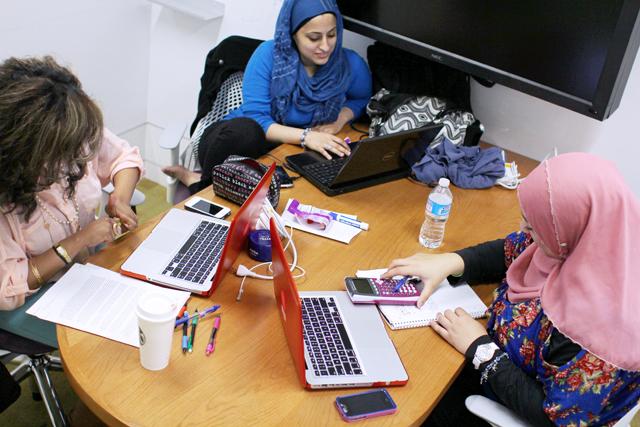 Yasmine Ahmed, Milah Mohsin and Nisma Gabr study in a small group study room in the Hunt Library Saturday." />
Yasmine Ahmed, Milah Mohsin and Nisma Gabr study in a small group study room in the Hunt Library Saturday." />
Yasmine Ahmed, Milah Mohsin and Nisma Gabr study in a small group study room in the Hunt Library Saturday.
Students can reserve study rooms online, but there is no guarantee of availability when they arrive.
D.H. Hill Library technician Will Reddy explains the biggest problem with the study room reservation system is there is not enough space to hold the great number of students at the University.
The library staff revolves around the needs of the student body, according to Reddy, who has served as technician at the library since 1998. He said he defends the reservation system, as it follows the same student-oriented approach.
A few guidelines have been put in place by the University to maximize the efficiency of the reservation system, Reddy said. He urges students and faculty to plan ahead and reserve study spaces as early as seven days in advance.
Students begin the reservation process by locating the “reserve a room” link on the library’s website, where they are prompted to reserve any room at any time. There is no way to prevent a room from being occupied without reservation, but there is also no way to find out whether a group decided to fulfill their reservation.
The staff allows reservations to be made in two-hour increments, but only one reservation can be made by each user in a 24-hour span.
The library website defines a group as two or more people, and states a group will have priority over a single user. If the party fails to show up within the first 15 minutes of its reservation, the space is opened to other users, but no rules are monitored by staff.
John Nardini, a senior in mathematics, is a frequent user of the study room system.
“I have never had a problem with reserving a room,” Nardini said. “People are usually polite and leave if I tell them I reserved the room.”
As a common courtesy, users are encouraged to cancel their reservation if they can no longer fill a time slot. A group may occupy an empty study space on a first-come, first-serve basis.
The library has taken action to increase the amount of area available for users, Reddy said. One way the staff has increased the efficiency of space is by placing sound-proof, dividing walls in six, existing study rooms.
Some study lounges in D.H. Hill have been updated with dry erase boards, writeable walls and two monitor screens for group collaboration.
Reddy said he “rarely finds empty rooms” on his walk-throughs of the Book stacks section.
Reddy does not think the demand for study space has declined at D.H. Hill since the opening of the James B. Hunt Library on Centennial Campus either, especially during the day when students living anywhere make use of the library.
Students who live on campus and those who use the parking decks during business hours are the primary users at D.H. Hill, Reddy said, and since there is lack of space dedicated to graduate students, he labeled D.H. Hill as an “undergraduate library.”
According to Reddy, student numbers tend to reach a climax at Hunt Library after 6 p.m. due to the convenience of parking and the great amount of study space available. Some study spaces at Hunt Library cater directly to the needs of graduate students and faculty by offering an exclusive-access wing.
Reddy thinks that being able to effectively manage Hunt in addition to D.H. Hill will be an important challenge.
“The library is the heart of the campus. It is an incredible resource and tool,” Reddy said.